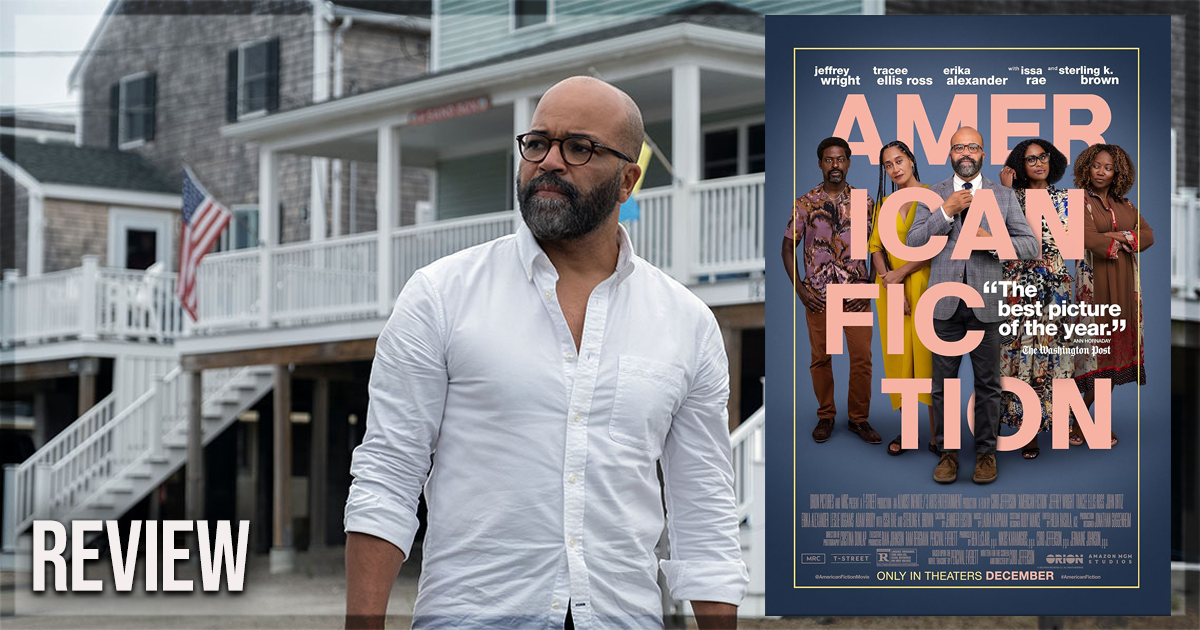I live in West Virginia, right in the heart of Appalachia. I love my state, but I don’t always love the way that the people who live here have been portrayed in the media. Poverty porn, like what was featured in both the book and the film Hillbilly Elegy, reduces the people of Appalachia to a meme rather than allowing people to gain a fuller understanding of what it means to live in this region. I brought that perspective to my viewing of Cord Jefferson’s feature debut, American Fiction.
Thelonius’ Monk’ Ellison (Jeffery Wright, The Batman, Westworld) is an author struggling to find commercial success with his writing. When his mother (Leslie Uggams, Deadpool) falls ill, he heads to Boston to help out, reconnecting with his sister Lisa (Tracee Ellis Ross, Black-ish) and his brother Cliff (Sterling K. Brown, This is Us, Black Panther).
Wright, Ross, and Brown have a believable family chemistry
Right out of the gate, I loved the family dynamic between the siblings. While nothing physically made me see them as family, how they interacted with one another read very much like how family interacts. The script, by Cord Jefferson, and how the actors delivered it made me genuinely believe that these three were related.
After seeing Sintara Golden (Issa Rae, Barbie, The Hate U Give), an author who has had critical and financial success with her book We’s Lives in Da Ghetto, Monk decides to try his hand at the kind of writing that thrills white audiences. He sends it off to his agent (John Ortiz, Silver Linings Playbook) under the pseudonym Stagg R. Leigh, certain that it will be laughed at by the same publishers that have passed on his other books. Instead, a publisher comes back to him with a $750,000 contract. Soon after, a movie studio comes to him, offering $4 million for the rights to the book.
American Fiction balances humor and satire with family drama
One of the things that the story does well is to balance the humor and satire with the actual drama taking place in Monk’s family. Throughout American Fiction, we see that life is hard for Monk and his family. They experience divorce, separation, coming out, and the slow loss of a parent. So much of the Black experience that Monk has is relatable to a white audience, but the only interest that is shown in his writing is when it is something displaying Black trauma in a way that fits with the narrative that many white people have in their minds.
American Fiction’s strength is undoubtedly in its storytelling. It does a fantastic job showing the audience not only the expectations that white audiences have about what qualifies as Black literature but also how sometimes those in the minority can also become beholden to those expectations.
Monk pulls away when he’s challenged and it isolates him
One of the film’s most compelling scenes is a conversation between Monk and Sintara, as the two are part of a group of judges choosing which book will win a prestigious literary award. They both agree that Stagg R. Leigh’s book is derivative and soulless, but when Monk asks how it differs that much from her book, she takes umbrage with that, citing the numerous interviews and research that she did preparing to write her novel. Sinatra tells Monk that he seems to have a problem with white people and their expectations, not with her book.
We see this with Monk’s character throughout the film. When he feels challenged, he pulls away. His siblings both accuse him of this behavior and then we see it again in his relationship with his girlfriend Coraline (Erika Alexander, Living Single). Rather than engaging with people and ideas as they are, he tries to fit them into the boxes he has constructed, often leaving him isolated from those who want to be close to him.
Final thoughts on American Fiction
More than anything, I think that is what this film is about. The way that media shapes the expectations that people have about certain groups, but also the way that people bring expectations about groups to media. In today’s media landscape, we can access whatever sates our desires without challenging our biases and prejudices. We can find films, news, and memes that reflect what we already believe.
I went into American Fiction expecting a particular film and got something else. There are almost two distinct movies inside this one piece of art. But rather than feeling disjointed, they coalesce in a way that reminds us, as viewers and consumers of art, that stories are more complex and varied than we might expect.
In one scene, Cliff laments that his father never knew him as a gay man: that even if he had his suspicions, he never got to accept or reject his true self. He then urges Monk to let people love the whole of himself. At its heart, American Fiction offers that same sentiment to those of us watching. To accept art and those who make it for what it is rather than what we want it to be, and to allow that to change us into more compassionate, thoughtful people, able to give and receive love more freely.
American Fiction is now in theaters
American Fiction is now playing in theaters. Learn more about it, including how to get tickets, at the official MGM website for the film.
Have you watched American Fiction yet? What did you think? Join the conversation by leaving a comment below or by messaging us on X @MoviesWeTexted.
You might also like…
Review: ‘Mr. Monk’s Last Case: A Monk Movie’ – Monk still has something to say
The 25 best movies of 2023 – from ‘The Killer’ to ‘Oppenheimer’
Review: ‘Perfect Days’ has a simple premise but profound meaning

